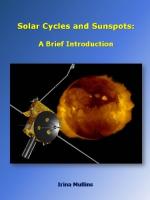|
This section contains 1,365 words (approx. 5 pages at 300 words per page) |

|
A sunspot is an area of the Sun's photosphere, appearing darker to the eye than surrounding areas of the Sun. Although very hot by any terrestrial standard, sunspot regions are cooler that surrounding solar surface. Sunspots occur in cycles and are associated with a strong solar magnetic field. Variations in the solar magnetic field impact the space environment of Earth (sometime termed "space weather" and therefore have at least a correlated effect on Earth's weather and climatic conditions.
Large sunspots, visible to the naked eye, were noted by the ancient Chinese. The first specific mention of sunspots in modern scientific literature was by Italian astronomer and physicist Galileo Galilei (1564–1642) in his Starry Messenger published in 1610. Sunspot occurrence has been carefully noted by astronomers ever since. Astronomers have found that the frequency of sunspots varies with a period of between 11 and 13 years. This corresponds to...
|
This section contains 1,365 words (approx. 5 pages at 300 words per page) |

|


